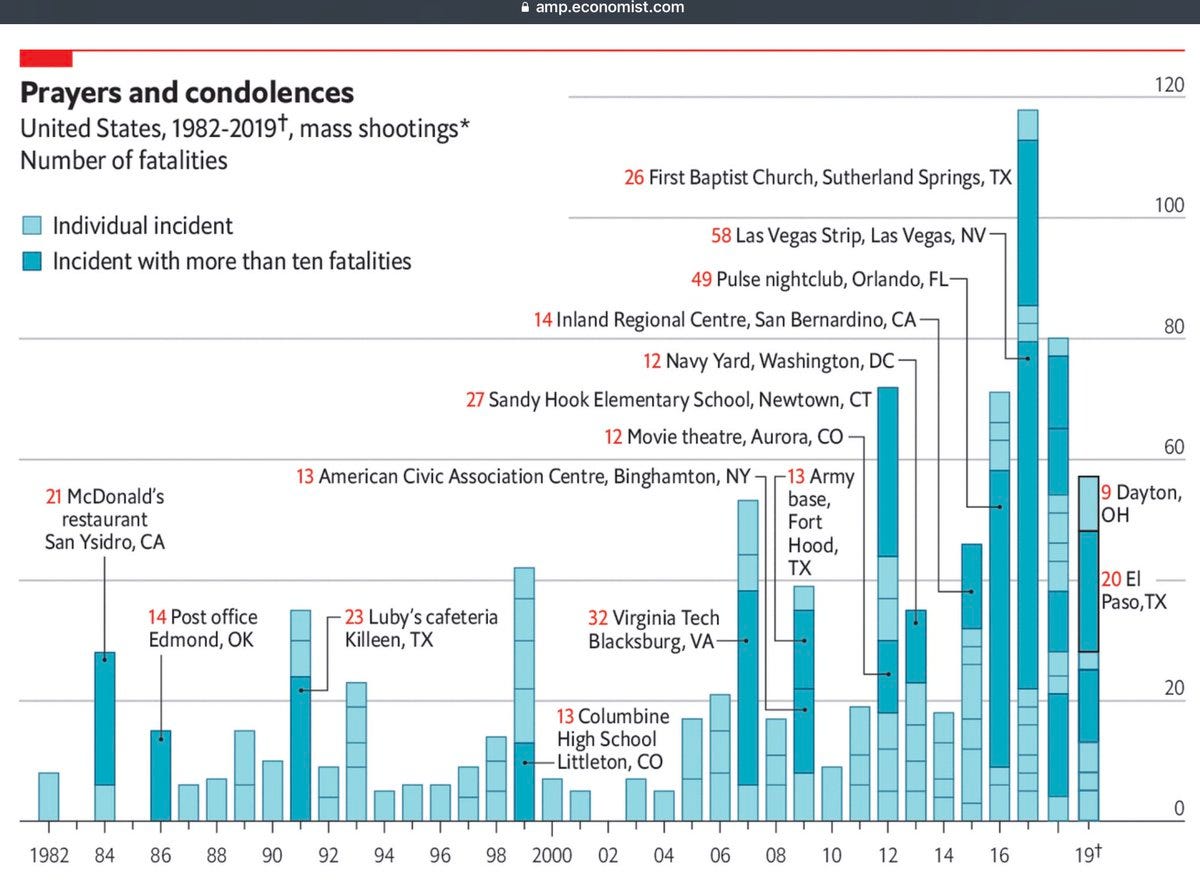The Precarity of Our Situation
Society, and the stock markets that price future risk, are underestimating the precarity of our collective situation. We are staring at the precipice of environmental disaster, economic collapse, and an end to democratic governance. Any of this may or may not come to pass, but that it "might" is seemingly ignored, and anyone who mentions it is disparaged as a Cassandra, as if she didn't speak the truth.
Environment: The environmental disaster awaiting us is getting more obvious. The earth is large but finite, and there are only so many emissions it can absorb in a given time. The capacity of this system is being saturated by the quantity of pollutants being emitted. Unfortunately for public policy, this is a slow-moving crisis and it does not respect national borders.
Sure there are some good trends for society overall, criteria air pollutants are largely down over the past few decades in most developed countries, but CO2 emissions keep rising, deforestation is chopping apace, birds are dying, ice is melting, and sea levels are rising.
Solutions like the deployment of renewable energy sources and electrification of the industrial and transport sectors are necessary steps. These steps will occur if the apocalypse does not arrive first, but are not likely fast enough to mitigate many of the impacts, which are baked in, so to speak. Reforestation and afforestation and the like may actually capture carbon. But these are long-term downstream solutions to a problem that is occurring now.
Economy: While I do not know if the market will crash tomorrow or next year, people's collective beliefs are this will not happen at all. There are many downside risks. First, the people actually managing money supply and fiscal policy and so on are not quite the smartest people in the room. The US and many other governments have collectively decided that revenues and expenditures can be completely unhinged, even during an economic expansion. Money was always a fiction, but it becomes more fantastic every day.
To be clear, some risks are so terrible they are not worth pricing. For instance, let's suppose there were a 10% chance of a large meteorite hitting the earth next year, killing human life on earth. In this case, stocks are worthless. That scenario also implies a 90% chance that life continues, in which case stocks are worth $1M. The expected value (EV) would logically be $900k. However that's not the right way to price this risk: if stocks are worth zero, you won't be around to not cash in, and if you short the market, you can never collect your winnings. Instead, we bet contingent on existence: P(EV|Existence).
However, there are also many non-existential, but still pretty bad, risks that people do not seem to be fully factoring in. Among them
war
environmental catastrophe short of annihilation
fast-spreading epidemic
trade war
depression/loss of confidence/recognition of bubble
technological catastrophe
fuel price rises/shortages before society is adapted to electrification
Democracy: There are a number of problems whose growth is exponential rather than linear or logarithmic. Economists look at the totals and say, while it is not good, it is also minor. A linguist says violence is declining over the long run. But consider mass shootings in the United States. While obviously a terrible thing, they are still (fortunately?) a very small share (less than 1%) of overall homicides (19,880) and deaths. But as this graphic from the Economist shows, they are growing at a roughly exponential rate. The increasing concern is probably due to the public's ability to perceive change, compounded by an increasingly real-time, pervasive media that brings distant dangers near, rather than absolute levels.
The media that exaggerates the risk also compounds it, as the idea of committing mass shootings also spreads. It is doubly-frustrating because this is an eminently solvable problem, as it is much less common in nearly every other country. Yet the US political system remains unable to resolve this, despite the horror.

Democracy is also in decline globally, as I noted in the previous post, according to Freedom House: (also note the axis is not zero, so it's worse than it looks).

In the Balance: I have put together an informal catalog of well over 100 global problems, some of which I will discuss in future posts. This is far from a complete list, and focuses in more depth on the things I pay attention to, but it's a start.
The good news is that most of these are resolvable. Some things are getting better, over the long run.
The bad news is that while they are resolvable, there is no evidence our political system will actually resolve them in a timely manner. And while some things may be getting better, many are hardly in good shape now. As I like to tell my class, things that are not sustainable do not sustain. But how that unsustainable behavior resolves remains open.

